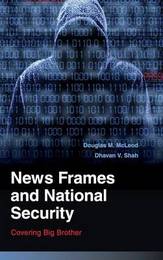
|
News Frames and National Security: Covering Big Brother
Hardback
Main Details
| Title |
News Frames and National Security: Covering Big Brother
|
| Authors and Contributors |
By (author) Douglas M. McLeod
|
|
By (author) Dhavan V. Shah
|
| Series | Communication, Society and Politics |
|---|
| Physical Properties |
| Format:Hardback | | Pages:238 | | Dimensions(mm): Height 229,Width 157 |
|
| ISBN/Barcode |
9780521113595
|
| Classifications | Dewey:302.230973 |
|---|
| Audience | | Professional & Vocational | | Tertiary Education (US: College) | |
|---|
| Illustrations |
6 Tables, unspecified; 28 Line drawings, unspecified
|
|
Publishing Details |
| Publisher |
Cambridge University Press
|
| Imprint |
Cambridge University Press
|
| Publication Date |
31 December 2014 |
| Publication Country |
United Kingdom
|
Description
Did media coverage contribute to Americans' tendency to favor national security over civil liberties following the 9/11 attacks? How did news framing of terrorist threats support the expanding surveillance state revealed by Edward Snowden? Douglas M. McLeod and Dhavan V. Shah explore the power of news coverage to render targeted groups suspicious and to spur support for government surveillance. They argue that the tendency of journalists to frame stories around individual targets of surveillance - personifying the domestic threat - shapes citizens' judgments about tolerance and participation, leading them to limit the civil liberties of a range of groups under scrutiny and to support 'Big Brother'.
Author Biography
Douglas M. McLeod is the Evjue Centennial Professor in the School of Journalism and Mass Communication at the University of Wisconsin, Madison. His research centers on communication content and effects, focusing on social conflicts and the mass media as well as framing and priming effects on attitudes and behaviors. Dhavan V. Shah is the Louis A. and Mary E. Maier-Bascom Professor at the University of Wisconsin, Madison, where he is Director of the Mass Communication Research Center. His work focuses on framing effects on social judgments, digital media influence on civic and political engagement, and the impact of health.
Reviews'This is an impressive collection of theories and empirical studies of framing effects in the important area of national security vs. civil liberties during the War on terror, it is theoretically sound and methodically rigorous ... this volume is a comprehensive synthesis of the theoretical approaches and research studies surrounding training effects on national security and civil liberties issues. The unifying model can be applied to framing effects in other research domains.' Weiwu Zhang, Communication Booknotes Quarterly
|